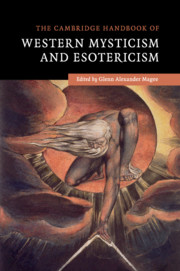Book contents
- Frontmatter
- Dedication
- Contents
- Acknowledgments
- Editor's Introduction
- List of contributors
- I ANTIQUITY
- 1 Ancient Mysteries
- 2 Pythagoras and Pythagoreanism
- 3 Parmenides and Empedocles
- 4 Plato, Plotinus, and Neoplatonism
- 5 Hermetism and Gnosticism
- 6 Early Jewish Mysticism
- 7 Early Christian Mysticism
- II THE MIDDLE AGES
- III THE RENAISSANCE AND EARLY MODERNITY
- IV THE NINETEENTH CENTURY AND BEYOND
- V COMMON THREADS
- Suggestions for Further Reading
- Index
- References
1 - Ancient Mysteries
from I - ANTIQUITY
Published online by Cambridge University Press: 05 May 2016
- Frontmatter
- Dedication
- Contents
- Acknowledgments
- Editor's Introduction
- List of contributors
- I ANTIQUITY
- 1 Ancient Mysteries
- 2 Pythagoras and Pythagoreanism
- 3 Parmenides and Empedocles
- 4 Plato, Plotinus, and Neoplatonism
- 5 Hermetism and Gnosticism
- 6 Early Jewish Mysticism
- 7 Early Christian Mysticism
- II THE MIDDLE AGES
- III THE RENAISSANCE AND EARLY MODERNITY
- IV THE NINETEENTH CENTURY AND BEYOND
- V COMMON THREADS
- Suggestions for Further Reading
- Index
- References
Summary
Introduction
The institutions known as “mysteries” in Ancient Greece consisted of rites of initiation that offered individual access to the presence and power of the gods. Some of the mysteries were celebrated as early as Mycenaean times but had affinities with, and probable sources in, even earlier shamanic, goddess-cult, and Neolithic practices. In the Classical age, we find mysteries of Demeter and Persephone, The Great Mother, the gods at Samothrace and Andania. The mysteries of Dionysus were performed throughout Hellas, as were the mysteries of the ancient poet-prophet-hero Orpheus, probably in private settings. Later, in the Hellenistic period, there were mysteries of Isis and Osiris. And in Imperial times, mysteries of Mithras competed with Christianity for spiritual hegemony in the Empire. By far the most well known were the mysteries of Demeter and Persephone celebrated at Eleusis outside of Athens.
The ancient Greek language has two words for “that which is not to be spoken of”: arrheton and aporrheton. The first translates as “the ineffable”: that which, in principle, cannot be brought to speech; the second refers to that about which discourse is forbidden. The prohibition against speaking or writing of the ineffable may be statutory, as in classical Athens, or self-imposed, following from religious conviction.
The word “mysteries” (ta mysteria) comes to us directly from the Greek mysterion, “a secret rite,” which derives from two linked verbs: myo and myeo. Myo means to close up or conceal, as in closing the eyes and stopping the ears or as when a flower closes itself at nightfall. Myeo means to initiate – for example, to initiate someone into the mysteries. The mysteries in Ancient Greece concealed initiatory secrets that were both incapable of being rendered verbally and of which the initiate was forbidden to speak. The secret or secrets of each had to do with the experience of the deity. At Eleusis, it seems that the celebration culminated in a theophany of Demeter and/or Persephone, in which the celebrants participated.
The Eleusinian Mysteries
The Eleusinian Mysteries (or, more specifically, their culminating events) occurred fourteen miles west of Athens on the Bay of Salamis and were framed as a festival of Demeter and Persephone. They were held annually until the Christian authorities destroyed all pagan rites and attempted to eradicate authentic knowledge of pagan traditions.
- Type
- Chapter
- Information
- Publisher: Cambridge University PressPrint publication year: 2016
References
- 2
- Cited by



